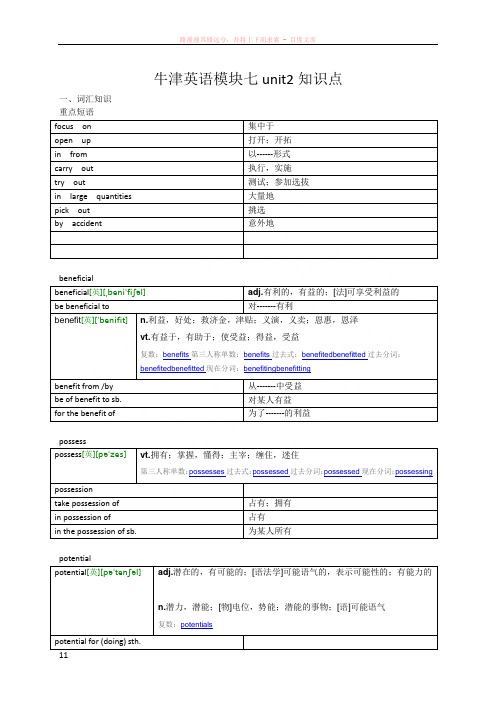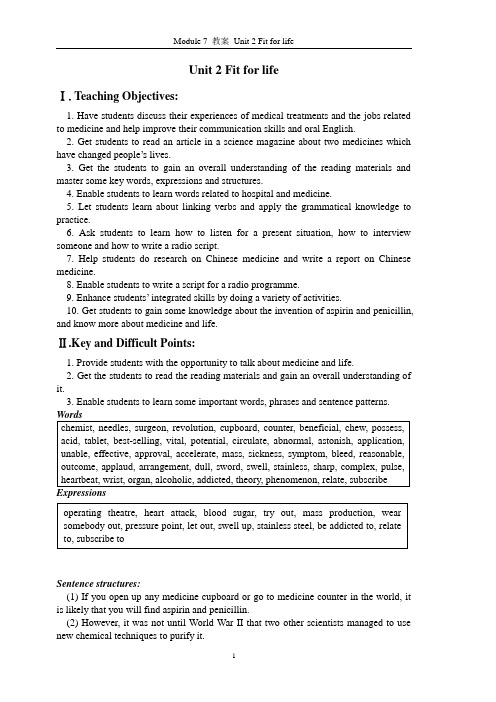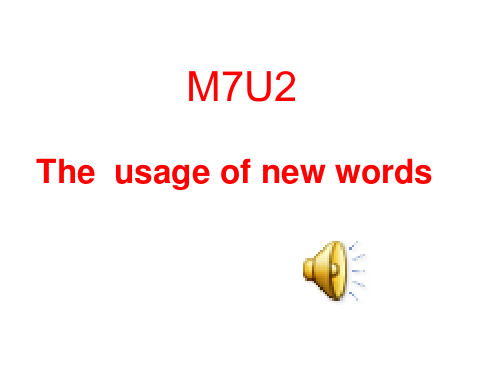n七模块二单元
- 格式:doc
- 大小:78.00 KB
- 文档页数:5

牛津英语模块七unit2知识点一、词汇知识重点短语focus on 集中于open up 打开;开拓in from 以------形式carry out 执行,实施try out 测试;参加选拔in large quantities 大量地pick out 挑选by accident 意外地beneficial[英][ˌbeniˈfiʃəl]adj.有利的,有益的;[法]可享受利益的be beneficial to 对-------有利benefit[英][ˈbenifit]n.利益,好处;救济金,津贴;义演,义卖;恩惠,恩泽vt.有益于,有助于;使受益;得益,受益复数:benefits第三人称单数:benefits过去式:benefitedbenefitted过去分词:benefitedbenefitted现在分词:benefitingbenefittingbenefit from /by 从-------中受益be of benefit to sb. 对某人有益for the benefit of 为了-------的利益possess[英][pəˈzes]vt.拥有;掌握,懂得;主宰;缠住,迷住第三人称单数:possesses过去式:possessed过去分词:possessed现在分词:possessingpossessiontake possession of 占有;拥有in possession of 占有in the possession of sb. 为某人所有potential[英][pəˈtenʃəl]adj.潜在的,有可能的;[语法学]可能语气的,表示可能性的;有能力的n.潜力,潜能;[物]电位,势能;潜能的事物;[语]可能语气复数:potentialspotential for (doing) sth.(做)某事的可能性realize one’s (full) potential (充分)发挥某人的潜能have the potential to do sth. 有做某事的潜力astonish Vt. 使十分惊讶,使吃惊astonish sb.使某人吃惊it astonishes sb. that------ -------让某人惊讶astonished adj. 感到十分惊讶的astonishing adj. 令人十分惊讶的astonishment n. 惊讶be astonished at ----- 对------感到惊讶be astonished see ----- 见到------觉得惊讶to one’s astonishment 令某人吃惊的是The astonishing news astonished everybody.And there were astonished looks on their faces. 那个令人惊讶的消息让大家感到惊讶,他们的脸上带着惊讶的表情。
![模块七 Unit 2 复习讲解及练习1[1]](https://img.taocdn.com/s1/m/bb7dfb7731b765ce0508147f.png)
模块七Unit 2 Fit for life 【No. 1】【考点透视】1.trial n.尝试;努力;试验;试用;询问;审讯Her child is a trial to his teacher.◎on trial在试验中,在测试中◎be on trial for sth. 因……而受审He’s on trial for murder.◎trial and error反复试验,从失败中找出解决办法try v.努力,尝试◎try to do努力干某事try doing试着、尝试干某2. name n.姓名vt.说出……名字;给……取名;提名;决定The couple named the child Dick.◎worth(worthy of) the name名副其实的◎in the name of凭……的权威,以……的名义◎call sb. names辱骂某人◎by name以名字,指名道姓地He was criticized by name.◎name…after…以……的名字命名◎name sb. as任命某人担任(某职务)Mr. Michael has been named as the new manager.3. mass n.质量,团,块,大量Density is the relationship between mass and volume.◎in the mass总体上;总的说来She says she doesn’t like children in the mass.◎mass media大众传媒◎the masses群众◎mass production大量生产◎a mass of/ masses of大量的I’ve masses of work to do, so I can’t see you off at the airport tomorrow.4. wonder n 奇观;惊叹;令人感到惊奇的人或事v.惊讶,想知道They were filled with wonder when they saw the palaces.It’s a wonder that he remained alive after dropping from the roof of a ten-storied building.○do wonders创造奇迹○in wonder惊奇地○no wonder怪不得No wonder he is not hungry; he has been eating sweets all day.(It is) no wonder that…怪不得……○wonder at/ about…对……感到惊讶○wonder that…想知道⊙wonder和wander为两个相似词但wonder意为惊讶,想知道;wander漫游,游荡5. point n.尖;观点,论点v.瞄准;指向point at/point to He pointed his gun at his enemy.to the point 中肯;恰当I wish she would get to the point and tell us what we should do.to the point of (doing) sth.达到某种程度He was rude to the point of being aggressive.up to a point 在某种程度上I agree with you up to a point.on the point of (doing) sth. 正要做某事时There is no / little / any / great point in doing sth. 做……没有/几乎没有/有意义point out 指出6. relieve v.安慰,宽慰;减轻(痛苦或者忧虑)This drug will relieve your discomfort.☆relieve one’s feelings 发泄感情☆relieve sb. of sth. 替某人拿……;解除某人负担、责任等relief n. 减轻,免除;安慰,宽慰;救济☆to one’s relief 使某人感到宽慰的是☆relief fund 救济金☆give relief to sb.’s sorrow 减轻某人的悲伤relieved adj.(感到或显出)宽慰的,放心的We felt relieved to hear you were safe7. millions of 数百万的,大量的1)当million, thousand, hundred, dozen, score等表示约数时,其后要带of短语,这几个词都要用复数形式,且此类短语之前不可加具体的数量词。

Unit 2 Fit for lifeⅠ.Teaching Objectives:1. Have students discuss their experiences of medical treatments and the jobs related to medicine and help improve their communication skills and oral English.2. Get students to read an article in a science magazine about two medicines which have changed people’s lives.3. Get the students to gain an overall understanding of the reading materials and master some key words, expressions and structures.4. Enable students to learn words related to hospital and medicine.5. Let students learn about linking verbs and apply the grammatical knowledge to practice.6. Ask students to learn how to listen for a present situation, how to interview someone and how to write a radio script.7. Help students do research on Chinese medicine and write a report on Chinese medicine.8. Enable students to write a script for a radio programme.9. Enhance students’ integrated skills by doing a variety of activities.10. Get students to gain some knowledge about the invention of aspirin and penicillin, and know more about medicine and life.Ⅱ.Key and Difficult Points:1. Provide students with the opportunity to talk about medicine and life.2. Get the students to read the reading materials and gain an overall understanding of it.3. Enable students to learn some important words, phrases and sentence patterns.operating theatre, heart attack, blood sugar, try out, mass production, wear somebody out, pressure point, let out, swell up, stainless steel, be addicted to, relate to, subscribe toSentence structures:(1) If you open up any medicine cupboard or go to medicine counter in the world, it is likely that you will find aspirin and penicillin.(2) However, it was not until World War II that two other scientists managed to use new chemical techniques to purify it.(3) It was over a decade before someone else turned penicillin into the great drug of the 20th century.(4) Not only has aspirin proved vital for reducing fever and helping stop pain, but there are also other things that aspirin can help with.4. Help students learn what verbs can be used as linking verbs and how to apply them to practical use.5. Practice the students’ listening, speaking, reading and writing skills by learning the Task section.6. Help students apply what they have learnt to practice by writing a report on Chinese medicine.Ⅲ. Teaching Methods:1. Group work and individual work2. Explanation and practice3. Question-and-answer activity4. Brainstorming5. Listening, speaking, reading and writingⅣ. Teaching Aids:1. A loudspeaker2. A multimedia computer3. A blackboardⅤ. Teaching Periods:Periods 1-2 Reading comprehensionPeriods 3-4 Language pointsPeriods 5-6 Language practicePeriods 7-8 Word powerPeriods 9-10 Grammar and UsagePeriods 11-12 Grammar PracticePeriods 13-14 TaskPeriods 15-16 ProjectPeriods 17-18 Revision & ExercisesPeriods 1-2 Reading comprehensionⅠ.Teaching Objectives:1. Have students discuss their experiences of medical treatments.2. Get students to read an article in a science magazine about two medicines which have changed people’s lives.3. Have students reinforce their abilities of reading and speaking.4. Enable students to gain some knowledge about medicine and life.Ⅱ. Key and Difficult Points:1. Gain a good understanding of the text through different reading activities.2. Learn how to understand medical terms and learn effective ways to read medical articles.3. Improve students’ thinking ability through discussion and their reading ability. Ⅲ. Teaching Methods:1. Group work and individual work2. Speaking3. Fast-reading and detailed-readingⅣ. Teaching Aids:1. A multimedia computer2. A blackboardⅤ. Teaching Procedures:Step 1 Lead-in1. Fill in the blanks:A good ______________ tastes bitter.Laugh is the best ________________ in the worldThere is no ________________ against death.2. Questions✧What medicines have you ever taken? And what do you know about them?✧How much do you know about the two medicines?✧Who invented the two medicines?✧What illnesses can the two medicines be used to treat?Step 2 First readingAsk students to go through the text quickly and try to find the answers to the following questions:✧When was aspirin first sold as a tablet? (In 1900.)✧What did Fleming, Florey and Chain share?(The Nobel Prize.)Step 3 ListeningListen to the article and try to answer the questions in C1 on page 20. Then checktheir answers.Answers:1. About 2500 years ago.2. In 1897.3. It can also help reduce the risk of heart attacks by thinning blood, prevent a stroke, reduce the risk of colon cancer, increase the length of people’s lives and help with diabetes.4. In the mould that killed bacteria.5. It can be used to treat bacterial illnesses and other illnesses including pneumonia.6. Because Fleming discovered penicillin and the others turned it into the great drug which saved millions of lives.Step 4 Second readingGet students to read the text carefully and try to find the following information:✧Development of aspirin:✧Development of Penicillin:Sold in shopsas a tablet 19001928Discovered by Alexander Fleming WorldWar IIFound newchemicaltechniques topurify itAll the scientistsshared the NobelPrize1945As the best-selling painkillerrecorded in theGuinness Book195019711977200319001928WorldWar II19451950197119772003 Proved to be ablood-thinningmedicineUsed to preventa strokeUsed to reduceblood sugar levels✧Effects of aspirin:✓Reduce fever✓Help stop body pains✓Reduce the risk of heart attacks✓Prevent a stroke✓Reduce the risk of colon cancer✓Increase the length of people’s lives✓Help with diabetes✧Effects of penicillin:✓Help in treating wounds and infections✓Treat other illnesses including pneumoniaStep 5 DiscussionDivide the whole class into groups of six and ask students to discuss the following question:Do you believe that ―wonder drugs‖ will be invented to treat diseases like AIDS in the future?Step 6 Reading strategyHow can we understand medical terms?Words coming from the same stem:medicine, medical, medicinal;pure, purify;chemical, chemist;bacterium, bacterialWords that are compound words:painkillerblood-thinningheart attackacetylsalicylicWords with irregular plural forms:bacteriabacteriumStep 7 ConsolidationPlay the recording of the text again and ask students to read after it, paying special attention to the pronunciation and sense groups.Step 8 HomeworkReview the whole article and underline the phrases and words you don’t know.[Explanation]本节课8个步骤5个层次安排:step 1 热身,引入话题;steps 2-4,通过快读和细节阅读以及听力训练了解文章大意;Step 5问题讨论,拓展性训练, 培养学生思辨能力;Step 6介绍阅读策略,培养学生阅读和认知策略;Step7 通过听录音及朗读课文来克服读音等障碍,同时加深对课文的理解;Step8作业。

牛津英语模块七Unit2 Project解析Project1. art: n. [U/C] 艺术,艺术品,技术,美术Children’s ~儿童艺术the fine ~s 美术a work of ~美术品an ~school 艺术专科学校The story is developed with great ~.那故事非常技巧地展开。
History and literature are among the ~s. 历史和文学都属于人文科学。
Teaching is an ~. 教学是一门艺术。
artist: 艺术家artistic: adj. 艺术的,有美感的,风雅的artificial: adj. 人工的,矫揉造作的~rain 人工降雨an ~smile 不自然的笑2. sharp: adj. / adv. 锋利的,陡峭的,敏锐的,轮廓鲜明的,(感觉,味道等)强烈的,整(指时刻)You must be very careful with his ~knife. 你用这把锋利的刀必须很小心。
She studies the young man with her ~bright eyes. 她以其明亮锐利的眼睛端详这年轻的男士。
That photograph is not ~enough. 那张照片不够清晰。
This cheese has a ~flavor. 这种奶酪的味道很刺激。
The lecture started at three o’clock ~. 讲座于3点整开始。
短语系列:~eyes 敏锐的目光~wind刺骨的风a ~turn 急转弯10 o’clock ~10 点整at 6 a.m. ~上午6点整试题回顾:1. 去年物价急剧上升。
______________________________________2. 别那样苛刻孩子们。
________________________________________3. 那个孩子物理非常优秀。


模块七第⼆单元语⾔点讲解Welcome to the unit1. If we need an operation, a special room called an operating theatre is used. (P17)如果我们需要做⼿术的话, 就使⽤⼀个特殊的被成为⼿术室的房间.operatev. [I] to cut a body open for medical reasons in order to repair, remove or replace a diseased or damaged part:If the growth gets any bigger they'll have to operate.Are they going to operate on him?v.[I or T] to (cause to) work, be in action or have an effect:How do you operate the remote control unit?Does the company operate a pension scheme?operationn. [C] when a doctor cuts a body for medical reasons in order to repair, remove or replace a diseased or damaged part: a major/minor/routine operationan abdominal/cataract/transplant operationHe's got to have an operation on his shoulder.[+ to infinitive] We will know in a couple of days if the operation to restore her sight was successful.n. [U] the fact of operating or being active:There are several reactors of the type in operation (= working) at the moment.We expect the new scheme for assessing claims to come into operation (= start working) early next year.operatorn. [C] 1) someone whose job is to use and control a machine or vehicle:a computer operator2) a company that does a particular type of business:a tour operator3) a person who helps to connect people on a telephone system2. Have you ever seen a doctor? If so, what happened? (P17)你到医⽣那⼉看过病吗? 如果看过, 是发⽣了什么问题?everadv. 1) at any time:Nothing ever happens here in the evenings.Have you ever been to London?He hardly ever (= almost never) washes the dishes and he rarely, if ever, (= probably never) does any cleaning.The smell is worse than ever.I thought she was famous, but none of my friends have ever heard of her.2) continually:He is ever repeating the same old story.3) used for emphasizing an adjective:Yesterday the company announced its first ever fall in profits.4) for all time:I like the house but I don't imagine I'll live there forever.5) continually since that time:He's been depressed ever since he got divorced.Reading---Two life-saving medicines1. If you open up any medicine cupboard in the world, there is a high probability that you will find aspirin and penicillin. (P18)倘若你打开世界上任何⼀个药柜,都很可能找到阿司匹林和青霉素。
模块七第二单元讲义-(总20页)-CAL-FENGHAI.-(YICAI)-Company One1-CAL-本页仅作为文档封面,使用请直接删除环球教育学科教师辅导讲义2.It was/is+强调部分+that+其他It_was in 1897 that a European chemist called Dr Felix Hoffmann produced aspirin from this chemical.在1897年,一位欧洲的名叫菲力克斯·霍夫曼的博士用这种化学药品制成了阿司匹林。
3.not only置于句首的倒装结构Not_only_has aspirin proved vital for reducing fever and helping stop pain,but there are also other things that aspirin can help with.阿司匹林不仅被证明对于退烧、止痛必不可少,而且还有其他用途。
4.on doing sth.一……就……On_arriving_at the hospital reception,we saw there were a lot of people there.一到达医院的接待处,我们就看见那里有很多人。
5.while连接并列句,表对比Some acupuncturists insert needles at or near the body part affected by the disease,while others select points according to the symptoms that the patient has.一些针灸师在受该疾病影响的部位或其附近插入针头,而另外一些则根据病人的病症选择扎针的位置。
二.Explanation(精讲):解析7个考纲单词1.vital adj.对……极重要的,必不可少的Not only has aspirin proved vital for reducing fever and helping stop pain,but there are also other things that aspirin can help with.阿司匹林不仅被证明对于退烧、止痛必不可少,而且还有其他用途。
高二英语模块7Unit2语言点详解及同步复习I .Key Phrases of this unit:➢ focus on 集中于(某事物)➢ open up 打开➢ carry out 执行;实施;完成➢ give up 放弃➢ mass production 大量生产➢ see through 看透;识破➢ be made from 由、、、做成,用、、、做成➢ try out 试验➢ put off 推迟;推延➢ put up with 忍受➢ look down up 轻视;看不起➢ make out 分清;认出来➢ be unable to 不能,不会➢ in addition 除、、、之外;另外➢ in large quantities 大量地➢ come true 成为现实;实现➢ be used to 被用于;习惯于➢ figure out 计算出;解决;合计(为)➢ be made from 由、、、制成➢ be funfamental to 对、、、是必要的;对、、、是根本的➢ thousands of 成千上万的➢ have influence on 对、、、产生影响➢ go away 走;开离开;消失➢ leave behind 忘带;留下;超过➢ save one ’s life 救某人的命➢ make the arrange of 作安排➢ talk over (彻底而严肃地)商议,商量,讨论➢ set up 设置,树立,建立,设立,创办➢ go wrong 犯错;弄错,走错了路;出了毛病,坏掉➢ take measures to do sth 采取措施做某事nguage points1.open up 打开;开发;开始They opened the country up to trade 他们开放国家,以进行贸易。
单项填空1.The restaurant _____ all ,without distinction of colour.A .opens up B.is open to C .opens with D.throws open2.---Would you like to go out?---Yes ,I like playing ______ .A.in the open airy openC.into the openD.in open3.Don ’t open fire _____ him without permission.A.atB.inC.ofD. with2.There is a probabilility/possibility that +从句“很有可能/有可能、、、”He worked deep into night last night.There is a probability that he will be late for work today.昨晚他工作到深夜,今天他很可能会上班迟到。
牛津英语模块七Unit2 Grammar解析Grammar and usage1. enquiry: n. [C] (pl. enquiries) 询问;打听;调查further ~进一步调查make enquiries about 询问情况learn sth. by ~询问得知……2. ward: n. 保卫;牢房;病房;监护surgical ~外科病房vt. 守护;保卫;防止;挡住keep watch and ~over a person 日夜监视某人3. annual: adj. 一年一次的;每年的;一年生的n. 一年生植物;年刊;年鉴What is your ~income? 你的年收入是多少?an ~event 年度大事~ly: adv. 每年;每年一次4. arrangement: n. [U] 布置,准备(用作pl. 形式)We have finished all the ~s for the party. 我们已经完成了所有聚会的准备。
We made an ~to meet at the airport. 我们安排在机场见面。
arrange: v. 安排;排列;协商~a room / flowers / books 安排一个房间/ 摆放鲜花/ 摆放书本~(for) a taxi 安排一辆出租车~an appointment for sb. with sb. else 为某人安排与别人约会I’ve ~ed for him to meet me.我已经安排他和我见面。
练习:1. Have you made ________________ for you journey to Russian?2. Before going away, he ________________ his business affairs.5. receptionist: n. 招待员;传达员reception: n. [C][U] 接待;招待会;接收~desk (旅馆,饭店的)接待处~room 接待室;Jim had an enthusiastic ~when he returned home.吉姆回家时受到了热情的款待。
Unit2 核心词汇精讲1.share / ʃeə/ v. 分享We share a cat to work. 他们拼车上班【拓展】(1)share分享,分担(2)表示“与某人分享……;与某人分担某事〞时,常与介词with构成share (in)sth with sb构造。
2.often / 'ɒf(tə)n/ adv. 经常,为频度副词I am often here at three o’clock.我们经常在三点钟到这里。
3.customer / 'kʌstəmə/ n. 顾客The customer is always right.顾客永远是对的。
4.Internet / 'ɪntənet/ n. 因特网We like surfing the Internet.我们喜欢上网。
【拓展】固定搭配:surf the Internet 上网冲浪on the Internet 在因特网上5.check / tʃek/ v. 检查,查看You must check the timetable.你必须检查一下时刻表。
【拓展】check in 登记入住,办理登记手续check out 结账退房,办理退房手续6.train / treɪn/ n. 火车The train never arrives on time.火车从未准时到。
7.travel / 'træv(ə)l/ n. 旅行My mother isn’t interested in travel.我妈妈对旅行不感兴趣。
8.plan / plæn/ n. 方案I should make a plan for our studies.我应该为我们的学习订一个方案。
【拓展】plan v. 方案;打算I plan to talk with my parents. 我方案和我的父母谈谈。
Do you plan to share the computer with your family?你方案和你的家人合用这台电脑吗?9.music / 'mjuːzɪk/ n. 音乐She likes art and music.她喜欢艺术和音乐。